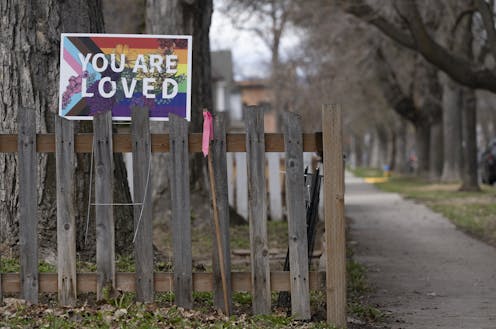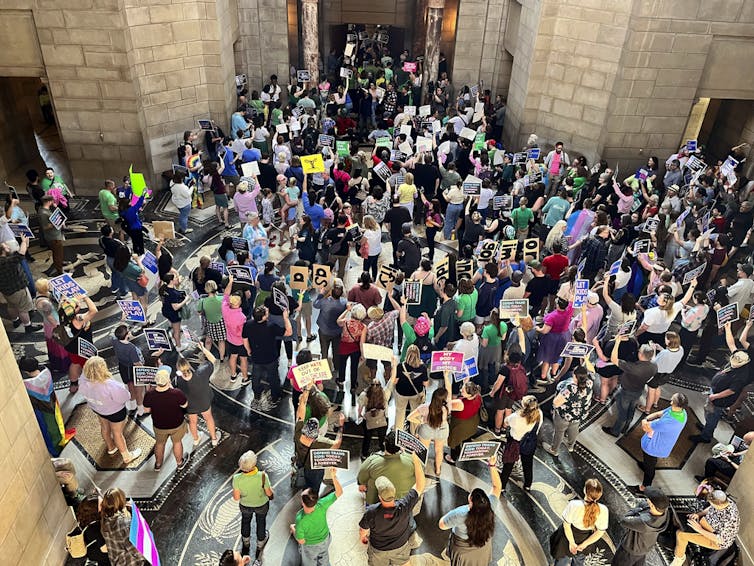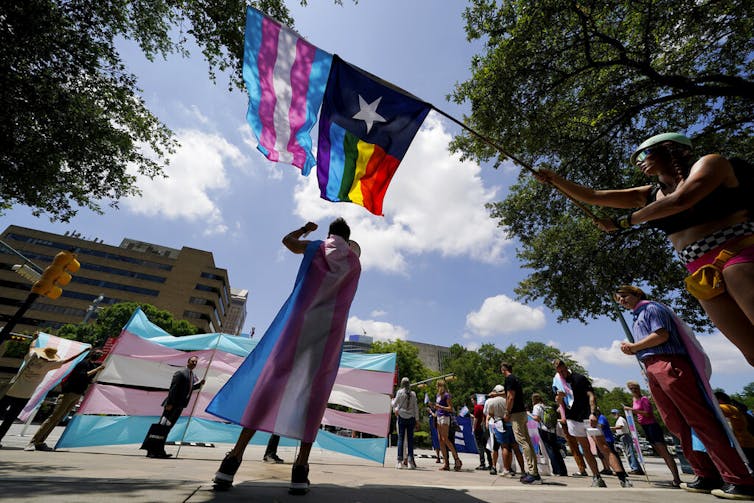
Pride month is a time of celebration for the LGBTQ+ community, with parades and events that bring people together in joyful moments of connection. In 2023, as the LGBTQ+ community is facing unprecedented legislative attacks, I am especially reminded of the history of protest and activism that is inherently a part of Pride and its origins.
There have been almost 500 bills proposed this legislative cycle seeking to limit the rights of LGBTQ+ people and their access to essential resources like medical care, nearly 12 times as many as there were in 2018. Many of these bills target transgender and nonbinary people, particularly youth access to gender-affirming medical care, falsely claiming that they are protecting children from abuse.
I am a psychologist, researcher and director of Trans-ilience, a community-engaged research team studying how stigma and oppression influence mental health for trans and nonbinary communities. We also study how trans and nonbinary people stay resilient in the face of such challenges. Whether or not these bills pass, the research is clear that the political climate itself can have significant negative effects on the lives of trans and nonbinary people, especially on their mental health and well-being.
Mental health burden of anti-trans legislation
When trans and nonbinary people see their rights broadly targeted across the country, many affected individuals feel the weight of the sociopolitical climate.
In a 2023 report from The Trevor Project, a suicide prevention nonprofit focusing on LGBTQ+ youth, 86% of trans and nonbinary youth across the U.S. reported that debates around state laws restricting LGBTQ+ rights negatively influenced their mental health. This political climate can leave trans and nonbinary people feeling on edge about their safety, concerned about their future and heighten feelings of distress like anxiety and depression. Families of trans and nonbinary youth also report fearing for their safety and fleeing areas where these bills are being passed. These bills are especially likely to elicit feelings of fear in trans and nonbinary people who have been victims of violence in the past, creating a cycle of distress in response to interpersonal acts of violence and the political climate.

On the other hand, research shows that trans and nonbinary people who live in areas with more inclusive policies and greater protections have overall better mental health. For instance, trans and nonbinary people who live in states with nondiscrimination protections are less likely to experience mood disorders or report symptoms of depression than those living in states without those protections. In addition, trans and nonbinary people living in areas with protective policies not only have less trouble accessing gender-affirming medical care but also may be less likely to avoid seeking health services in general because of fears of being mistreated.
Research also shows that medical providers who care for trans and nonbinary youth are likely to oppose legislation banning gender-affirming medical care because it is likely to cause harm to those patients, such as by increasing distress or heightening discrimination. Parents also fear the negative effects on their children of bans on gender-affirming care.
Anti-trans bills also seek to take away access to other important resources beyond gender-affirming medical care.
Book bans and bills banning any discussion of LGBTQ+-related topics in classrooms are likely to significantly affect the ability of trans and nonbinary youth to participate in school. For instance, research has shown that having gay-straight alliances and LGBTQ+-affirming policies in school systems is linked to a lower likelihood of experiencing bullying and higher levels of support from classmates and teachers. LGBTQ+ youth also report having more positive experiences at and perceptions of school when there are inclusive policies. These affirming and trans-inclusive spaces may become less accessible or cease to exist with bills that restrict discussion of LGBTQ+-related content in schools.

Shifting the political climate
Trans and nonbinary communities face ongoing struggles at unprecedented rates. The onslaught of anti-trans bills across the country has the ability to negatively affect nearly every facet of trans and nonbinary people’s lives, from free speech to health care access to protections against discrimination, to name just a few.
Everyone can play a role in shifting the sociopolitical context so that there are more protections for trans and nonbinary people and fewer attacks on that community’s rights and access to resources. Contacting legislators, organizing in your local community and raising awareness can help make a difference. Along with celebrating the LGBTQ+ community, such actions can help create a world in which trans and nonbinary people feel safe and respected and have access to the same resources and rights as others.
Don’t let the rainbows fool you – this fight isn’t over.
Jae A. Puckett and their research team, Trans-ilience, co-organize the Gender Affirmation Project with the Allen Neighborhood Center. This is a community organizing effort to improve trans and nonbinary people's access to legal name and/or gender marker changes in the Lansing, MI area. The views represented in this article are those of the author and do not necessarily represent their institution.
This article was originally published on The Conversation. Read the original article.







